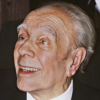Jorge Luis Borges

Jorge Luis Borges
Jorge Francisco Isidoro Luis Borges KBE; 24 August 1899 – 14 June 1986), was an Argentine short-story writer, essayist, poet and translator, and a key figure in Spanish-language literature. His best-known books, Ficcionesand El Aleph, published in the 1940s, are compilations of short stories interconnected by common themes, including dreams, labyrinths, libraries, mirrors, fictional writers, philosophy, and religion...
NationalityArgentinian
ProfessionPoet
Date of Birth24 August 1899
memories mean identity
I suppose identity depends on memory. And if my memory is blotted out, then I wonder if I exist - I mean, if I am the same person. Of course, I don't have to solve that problem. It's up to God, if any.
memories school reflection
Another school declares that all time has already transpired and that our life is only the crepuscular and no doubt falsified and mutilated memory or reflection of an irrecoverable process.
memories museums mirrors
We are our memory, we are that chimerical museum of shifting shapes, that pile of broken mirrors.
art memories men
The task of art is to transform what is continuously happening to us, to transform all of these things into symbols, into music, into something which can last in man’s memory. That is our duty. If we don’t fulfill it, we feel unhappy.
art memories book
The gods weave misfortunes for men, so that the generations to come will have something to sing about.” Mallarmé repeats, less beautifully, what Homer said; “tout aboutit en un livre,” everything ends up in a book. The Greeks speak of generations that will sing; Mallarmé speaks of an object, of a thing among things, a book. But the idea is the same; the idea that we are made for art, we are made for memory, we are made for poetry, or perhaps we are made for oblivion. But something remains, and that something is history or poetry, which are not essentially different.
dream morning memories
Days and nights passed over this despair of flesh, but one morning he awoke, looked (with calm now) at the blurred things that lay about him, and felt, inexplicably, the way one might feel upon recognizing a melody or a voice, that all this had happened to him before and that he had faced it with fear but also with joy and hopefulness and curiosity. Then he descended into his memory, which seemed to him endless, and managed to draw up from that vertigo the lost remembrance that gleamed like a coin in the rain - perhaps because he had never really looked at it except (perhaps) in a dream.
memories book axes
A book is more than a verbal structure or series of verbal structures; it is the dialogue it establishes with its reader and the intonation it imposes upon his voice and the changing and durable images it leaves in his memory. A book is not an isolated being: it is a relationship, an axis of innumerable relationships.
memories ends approach
As the end approaches, there are no longer any images from memory - there are only words.
memories paradox individual
That one individual should awaken in another memories that belong to still a third is an obvious paradox.
memories reality past
The future has no other reality than as present hope, and the past is no more than present memory.
memories night thinking
I cannot walk through the suburbs in the solitude of the night without thinking that the night pleases us because it suppresses idle details, just as our memory does.
memories book men
Of all man’s instruments, the most wondrous, no doubt, is the book. The other instruments are extensions of his body. The microscope, the telescope, are extensions of his sight; the telephone is the extension of his voice; then we have the plow and the sword, extensions of the arm. But the book is something else altogether: the book is an extension of memory and imagination.
memories men eden
Man's memory shapes Its own Eden within
concept destroyer empire limited whose
There is a concept that is the corrupter and destroyer of all others. I speak not of Evil, whose limited empire is that of ethics; I speak of the infinite.